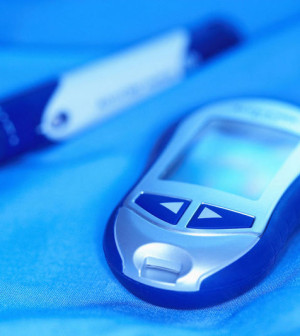- Could Artificial Sweeteners Be Aging the Brain Faster?
- Techniques for Soothing Your Nervous System
- Does the Water in Your House Smell Funny? Here’s Why
- Can a Daily Dose of Apple Cider Vinegar Actually Aid Weight Loss?
- 6 Health Beverages That Can Actually Spike Your Blood Sugar
- Treatment Options for Social Anxiety Disorder
- Understanding the Connection Between Anxiety and Depression
- How Daily Prunes Can Influence Cholesterol and Inflammation
- When to Take B12 for Better Absorption and Energy
- Epsom Salts: Health Benefits and Uses
FDA Issues Warning for Type 2 Diabetes Drugs


A certain class of type 2 diabetes drugs can lead to a life-threatening condition called ketoacidosis, the U.S. Food and Drug Administration warns.
These prescription drugs are called sodium-glucose cotransporter-2 (SGLT2) inhibitors and include canagliflozin, dapagliflozin and empagliflozin. They work by prompting the kidneys to remove sugar in the blood through urine.
The drugs are sold under the brand names: Invokana (canagliflozin), Invokamet (canagliflozin and metformin), Farxiga (dapagliflozin), Xigduo XR (dapagliflozin and metformin extended-release), Jardiance (empagliflozin), Glyxambi (empagliflozin and linagliptin).
Between March 2013 and June 2014, the FDA received 20 reports of the drugs triggering ketoacidosis, in which levels of blood acids called ketones are too high. If untreated, ketoacidosis can lead to a diabetic coma or even death, according to the American Diabetes Association.
All 20 patients had to go to an emergency department or were hospitalized, the FDA said.
Ketoacidosis typically affects people with type 1 diabetes, but all of these cases involved people with type 2 diabetes and the condition manifested itself slightly differently than in people with type 1 diabetes, the FDA said in a news release.
The agency said it’s investigating the issue to see if changes are needed in the prescribing information for SGLT2 inhibitors. The drugs are approved for use with diet and exercise to lower blood sugar in adults with type 2 diabetes.
Patients taking SGLT2 inhibitors should monitor themselves for any signs of ketoacidosis and seek immediate medical attention if they develop symptoms such as difficulty breathing, nausea, vomiting, abdominal pain, confusion, and unusual fatigue or sleepiness, the FDA said.
Ketones can be detected with a simple urine test using a test strip, similar to a blood testing strip, and you should ask your health care provider about when and how to test for ketones, according to the diabetes association.
Patients shouldn’t stop or change their diabetes medications without first talking with their doctor. If ketoacidosis is confirmed in a patient, doctors should take the patient off SGLT2 inhibitor, take appropriate action to correct the condition and monitor sugar levels, the FDA advised.
More information
The American Diabetes Association has more about diabetic ketoacidosis.
Source: HealthDay
Copyright © 2026 HealthDay. All rights reserved.










